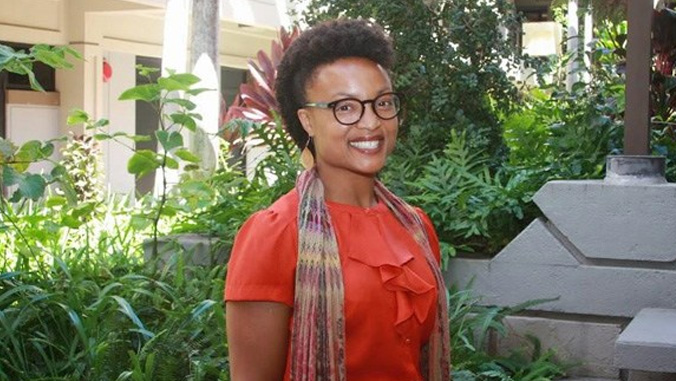
The University of Hawaiʻi at Mānoa William S. Richardson School of Law’s Environmental Law Program (ELP) celebrated its 30th anniversary with a conference on April 9 that invited participants to help re-envision the program’s future.
The conference featured presentations by Hawaiʻi Sen. Brian Schatz; former ELP Professor Shalanda Baker, who is now the first deputy director for energy justice and secretary’s advisor on equity at the U.S. Department of Energy in Washington, D.C.; and Julia Olson, the lead plaintiffs’ attorney in the Juliana v. United States climate case that alleges the government violated the rights of young people to a safe climate.
During the event, ELP founder Casey (Jarman) Leigh led a discussion on the next evolution of the ELP, environmental law education and professional responsibility. She was joined in the discussion by her successors, former UH law school Associate Dean Denise Antolini, and current ELP Director David M. Forman.
Forman acknowledged the incredible work of professors and students during past decades to build what is now a vibrant program that annually receives high rankings from U.S. News & World Report. This year the program rose six points to be ranked No. 24 in the nation out of 181 programs, and is one of the UH law school’s core speciality areas, with more than 250 graduates having earned the Environmental Law Certificate since 1991.
“Aunty Casey laid an incredibly strong foundation for our program based on high expectations and demanding standards as well as tremendous heart, setting an example for our students through her own service to the community,” said Forman, noting that he was one of the program’s first Environmental Law Certificate recipients.
“Denise expanded upon that vision in countless ways, including creation of the vibrant ELP Legal Fellows program that provides valuable opportunities for our graduates and serves a vital need for legal skills within government agencies; not to mention taking on high profile national and international assignments on top of her former decanal responsibilities,” Forman added. “With guidance from our talented ELP students, alumni and friends, we are looking forward to expanding our impact in a variety of ways for the next 30 years.“
Dean Camille Nelson noted the tremendous successes of the ELP, and said its ongoing importance is a high point of Richardson law school.
“The Environmental Law Program is a gem in our community. The talented faculty, staff, students and alumni enrich our entire school and set a high bar for excellence,” Nelson said. “Their dedication and commitment is to be commended. We are so proud of all that they have accomplished over the last three decades.”
An edited recording of the event will be posted on the ELP website in the near future.
This program is an example of UH Mānoa’s goals of Enhancing Student Success (PDF), and Building a Sustainable and Resilient Campus Environment: Within the Global Sustainability and Climate Resilience Movement (PDF), two of four goals identified in the 2015–25 Strategic Plan (PDF), updated in December 2020.
For more information, see the UH law school website.
–By Beverly Creamer

